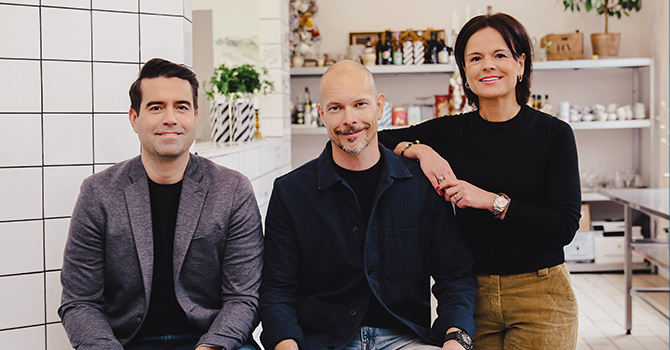Swedish pea-based milk alternative brand Sproud has secured $6.5 million in new funding from London-based growth capital investor VGC Partners, the company announced today.
Launched in 2018, Sproud has become one of several European plant-based milk brands — along with Minor Figures and BevNET’s 2020 Brand of the Year, Oatly — to cross over to the North American market. The company officially launched on Amazon and direct to consumer in the U.S. and Canada in July in four varieties — Original, Unsweetened, Chocolate and Barista — in 1 litre (33.8 oz) packs cartons, and has since expanded to 3,000 locations including at Sprouts Farmers Market, Vitacost and Loblaws. The company’s products are sold in 15 countries worldwide.
Though its investment portfolio ranges from tech to media to fashion, VGC also has a track record in CPG from its work with growth stage partners Ugly Drinks and clean condiment brand JUST.
“Through our experience of backing innovative food and drink brands, we have a deep understanding of the plant-based market, including from the perspective of evolving consumer demands and the cutting-edge product innovation that is catering to this,” said Parminder Basran, Founder and Managing Partner at VGC Partners, in a press release. “We believe Sproud has the potential to become a global leader in the huge and growing dairy alternative market, owing not only to its superior taste and nutrition profile, but also due to its positive environmental and sustainability credentials.”
Nicklas Jungberg, co-founder and Chairman of the Board at Sproud, added: “By matching the tastes that [consumers] are used to, and the nutritional content typically provided through dairy products, we know that we can make a huge impact, and with the support of Parminder and his incredible team, we feel confident that positive change can now be achieved faster, and on a much greater scale.”
With its financial position strengthened, Sproud will be looking to take advantage of consumers’ increasing demand for plant-based, non-dairy milk alternatives on both sides of the Atlantic. According to Euromonitor International, the U.S., United Kingdom and Germany are leaders in consumer acceptance, awareness, and variety and availability of plant-based dairy alternatives.

Speaking to BevNET last week, Sproud’s CEO and head of brand Maria Tegman said that the new funds will go towards growing the organization, broadening distribution and investing in marketing and consumer awareness. In terms of company structure, the capital will allow the brand to create a headquarters for its European business based in Malmo, which will complement a North American office in New York. Production will continue at Sproud’s facility in Toronto, with no immediate plans to expand.
“For the U.S., it’s important to set up a company and a group of employees over there that really has a feel for the [Sproud] culture,” Tegman said. “We will probably be recruiting four to five people in marketing and leadership positions over the coming months and start building out an office.”
Relative to other ingredients in the space, Sproud promotes its formulation — made from a proprietary blend of protein from yellow split peas, GMO-free oils and syrups — as requiring less water to grow than other crops, as well as offering less sugar and double the protein content of oat milk. Its credentials as a sustainable product extend to the aseptic packaging; not requiring refrigeration is another way in which the product lowers its total carbon footprint, Tegman noted.
Yet she also acknowledged that the brand has had to adjust to shopping behaviors in the U.S., where, unlike in Europe, the vast majority of consumers still buy milk almost exclusively from dairy coolers. According to the Good Food Institute, refrigerated plant-based milk makes up 89.5% of all plant-based milk dollar sales, while shelf-stable plant-based milk now makes up just 10.5%.
“In our vision to become the plant-based milk brand, we are of course evaluating if going into chilled is a need for the U.S. market specifically,” Tegman said. “But our intention is to hold as low a carbon footprint as possible, and that is why we are ambient today.”
